An introduction to “City of Women”
Read MoreOn artists, public debate and cultural spaces
Earlier this year we announced that writer and cultural activist Ahdaf Soueif is one of our 2019 Princess Margriet Award for Culture laureates. This met with a lot of support from people who know Soueif’s literary work and societal engagement. But the nomination also angered certain voices in Germany and in the Netherlands. We thus decided to organize two stakeholder meetings to discuss the role of artists in public debate.
Read MoreIn conversation with Ahdaf Soueif
Writer, cultural producer and political activist Ahdaf Soueif is one of the two laureates of the 2019 ECF Princess Margriet Award for Culture, together with City of Women. While representing distinct cultural approaches, both laureates offer a hopeful vision of democracy by redefining our understanding of culture and its capacity to improve a common European social reality. Prior to welcoming our laureates in Amsterdam on 2 October, we met Ahdaf Soueif at her home in Cairo in May 2019 to discuss her work.
Read More2019 ECF Princess Margriet Award for Culture Press Material
All available material about the laureates of the 2019 Award. Press releases, image material, and more.
Read MoreCultural and Creative Sectors' Call to Boost Creative Europe
Dear Members of the European Parliament,
We are writing as a group of 59 organisations from across the cultural and creative sectors ahead of today's vote of the Budget committee on the next EU Multi-Annual Financial Framework (MFF) 2021-2027.
We welcome the report's proposal to increase the Creative Europe budget to €2.8bn, and call on you to support this much needed boost to the only EU programme dedicated to cultural and creative sectors.
This ambition is shared by MEP Costa in her report on Creative Europe, as well as by MEP Grammatikakis in his report on a New European Agenda for Culture.
As it is now well established, culture and creativity are among Europe’s strongest assets. Their contribution to the social, economic and artistic development of Europe fully justifies the added value of an EU investment in culture.
But these sectors remain structurally underfinanced. As highlighted in the impact assessment accompanying the investEU proposal, the financing gap for creative SMEs and micro organisations across Europe is estimated to be somewhere between €8bn and €13bn.
At 0,16% of the MFF, the Creative Europe budget is by no means proportionate to these sectors' contribution, and the programme has very low success rates.
We hope we can count on you to support the proposed increased budget for Creative Europe.
Yours sincerely,
The undersigned organisations:
ACCR Europe (Réseau Européen des Centres culturels de rencontre)
AEC (Association Européenne des Conservatoires, Académies de Musique et Musikhochschulen)
AER (Association of European Radios)
Circostrada (European Network Circus and Street Arts)
CEPI (European Coordination of Independent Producers)
CEPIC (Centre of the Picture Industry)
Culture Action Europe
EAS (European Association for Music in schools)
ECF (European Cultural Foundation)
Europavox
European Choral Association - Europa Cantat
ECCD (European Coalitions for Cultural Diversity)
ECCO (European Confederation of Conservator-Restorers' Organisations)
ECHO (European Concert Hall Organisation)
ECSA (European Composer & Songwriter Alliance)
EFAITH (European Federation of Associations for Industrial and Technical Heritage)
EFFORTS (European Federation of Fortified Sites)
EHTTA (European Historic Thermal Towns Association)
EIBF (European and International Booksellers Federation)
EJN (Europe Jazz Network)
ELIA (European League of Institutes of the Arts)
EMC (European Music Council)
EMEE (European Music Exporters Exchange)
EMU (European Music School Union)
ENCATC (European Network on Cultural Management and Policy)
Europa Nostra, coordinator of the European Heritage Alliance 3.3
Eurosonic Noorderslag
Eurozine (European network of cultural journals and online magazine)
ERIH European Route of Industrial Heritage
ETC (European Theatre Convention)
EUYO (European Union Youth Orchestra)
EWC (European Writers' Council)
FEP (Federation of European Publishers)
FIA (International Federation of Actors)
FIAD (International Federation of Film Distributors' Associations)
FIM (Fédération Internationale des Musiciens)
FSE (Federation of Screenwriters in Europe)
GESAC (European Grouping of Societies of Authors and Composers)
IAMIC (International Association of Music Information Centres)
IAO (International Artist Organisation)
IFLA Europe (International Federation of Landscape Architects Europe)
IGCAT (International Institute for Gastronomy, Culture, Arts and Tourism)
IMMF (International Music Managers Forum)
IMPALA (Independent Music Companies Association)
IMPF (Independent Music Publishers International Forum)
INES (Innovation Network of European Showcases)
ISFE (Interactive Software Federation of Europe)
JMI (Jeunesses Musicales International)
Live DMA (European network for music venues and festivals)
Liveurope
NEMO (Network of European Museum Organisations)
On the Move (Cultural Mobility Information Network)
Pearle* (Live Performance Europe)
Res Artis (Worldwide Network of Artist Residencies)
Robert Bosch Cultural Managers Network
SHAPE (Sound, Heterogeneous Art and Performance in Europe)
TEH (Trans Europe Halles)
UNIC (International Union of Cinemas)
UNI MEI (UNI global union - Media and Entertainment International)
A Time to Stand Together
The Central European University, image from their website
Last week the Central European University in Budapest announced it would partially relocate to Vienna given the Hungarian government’s unyielding hostility to civil society and academic freedom. Around the world, civil society including academics, journalists and philanthropists, courageously pursue their mission, often at great personal cost.
We are a group of leaders of private philanthropic foundations committed to strong and vibrant civil society. A healthy, functioning democracy depends on it.
We condemn the violence directed to civil society activists globally. We deplore the growing climate of fear and intolerance in which civil society is publicly demonized, physically threatened and administratively shut down.
We stand side by side with our civil society peers.
Civil society is an essential pillar of democracy. Without it, our democracy is diminished.
We are proud to support it. We stand ready to defend it.
Signatories:
1. Max von Abendroth, Executive Director, Donors and Foundations Networks in Europe DAFNE, EU
2. Dr. Knut Olav Åmås, Executive Director, The Fritt Ord Foundation, Norway
3. Antti Arjava, Secretary General, Finnish Cultural Foundation, Finland
4. Andre Betting, Executive Director, Van Leer Group Foundation, the Netherlands
5. Göran Blomquist, Executive Director, Riksbankens Jubileumsfond, Sweden
6. Sanne ten Bokkel Huinink, Director, Fonds 1818, the Netherlands
7. James Chen, Chair, the Chen Yet-Sen Family Foundation, Hong-Kong
8. Kathleen Cravero, President, Oak Foundation, Switzerland
9. Dr. Lothar Dittmer, Chairman of the Executive Board, Körber-Stiftung, Germany
10. Adriana Esmeijer, Director, Prince Bernhard Cultural Foundation, the Netherlands
11. Michael Feigelson, Executive Director, Bernard Van Leer Foundation, the Netherlands
12. Rosa Gallego, Executive Director, Spanish Association of Foundations, Spain
13. Carrillo Gantner AO, Chairman, Sidney Myer Fund, Australia
14. Carl Gershman, President, National Endowment of Democracy, USA
15. Prof. dr. Michael Göring, Zeit Foundation, Germany
16. Sandro Giuliani, Managing Director, Jacobs Foundation, Switzerland
17. Stephen Heintz, President, Rockefeller Brothers Fund, USA
18. Mall Hellam, Executive Director, Open Estonia Foundation, Estonia
19. Jenny Hodgson, Executive Director, Global Fund for Community Foundations, South Africa
20. Dr. Wilhelm Krull, Secretary General, Volkswagen Foundation, Germany
21. Massimo Lappuci, General Secretary Fondazione CRT, Italy
22. Peter Laugharn, President and CE, Conrad N. Hilton Foundation, USA
23. Sara Llewellin, Chief Executive, Barrow Cadbury Trust, United Kingdom
24. Bharat Mehta CBE,Chief Executive,Trust for London, United Kingdom
25. Benoît Miribel, General Director, Fondation Merieux, France
26. Ieva Morica, Executive director, Foundation for an Open Society DOTS, Latvia
27. Isabel Mota, President, Calouste Gulbenkian Foundation, Portugal
28. Anke Pätsch, Association of German Foundations, Germany
29. Joanna Luberadzka-Gruza, President, Polish Donors Forum, Poland
30. Hilary Pennington, Executive Vice-President of Programs, Ford Foundation, USA
31. Nick Perks, Trust Secretary, Joseph Rowntree Charitable Trust, United Kingdom
32. Sigrid Rausing, President, Sigrid Rausing Trust, United Kingdom
33. Ebrima Sall, Executive Director, TrustAfrica, Senegal
34. Dr. Gerry Salole, CEO, European Foundation Center, Belgium
35. Göran Sandberg, Executive Director, Knut och Alice Wallenbergs Stiftelse, Sweden
36. Teresa Sanjurjo, Director, The Princess of Asturias Foundation, Spain
37. Prof. Dr. Andreas Schlüter, Secretary General, Stifterverband für die Deutsche Wissenschaft, Germany
38. Michael Schwarz, Executive Director, Mercator Foundation, Germany
39. Moira Sinclair, Chief Executive, Paul Hamlyn Foundation, United Kingdom
40. Aleksander Smolar, President, Stefan Batory Foundation, Poland
41. Dr. Rupert Graf Strachwitz, Executive Director, Maecenata Foundation, Germany
42. Luc Tayart de Borms, Managing Director, King Bauduoin Foundation, Belgium
43. Roxana Vitan, President, Romanian-American Foundation, Romania
44. Mr. Dimitris Vlastos, The Bodossaki Foundation, Greece
45. Katherine Watson, Executive Director, European Cultural Foundation, the Netherlands
European Cultural Foundation’s Director to Retire, Supervisory Board Announces New Director and Chair
The foundation’s supervisory board announces the new director and chair of the board.
Read MoreMedia coverage: 2018 ECF Princess Margriet Award for Culture
On 16 May 2018, the European Cultural Foundation celebrated a decade of change through culture. The laureates of the 2018 award are cultural centre Borderland (PL) and multidisciplinary research agency Forensic Architecture (UK).
The Award ceremony took place at the Stadsschouwburg Amsterdam, and was widely covered by the international media. You can have a glimpse of the ceremony and some behind the scenes moments on our Instagram and Twitter.
Images are available for download from our Flickr account. All photos by Xander Remkes.
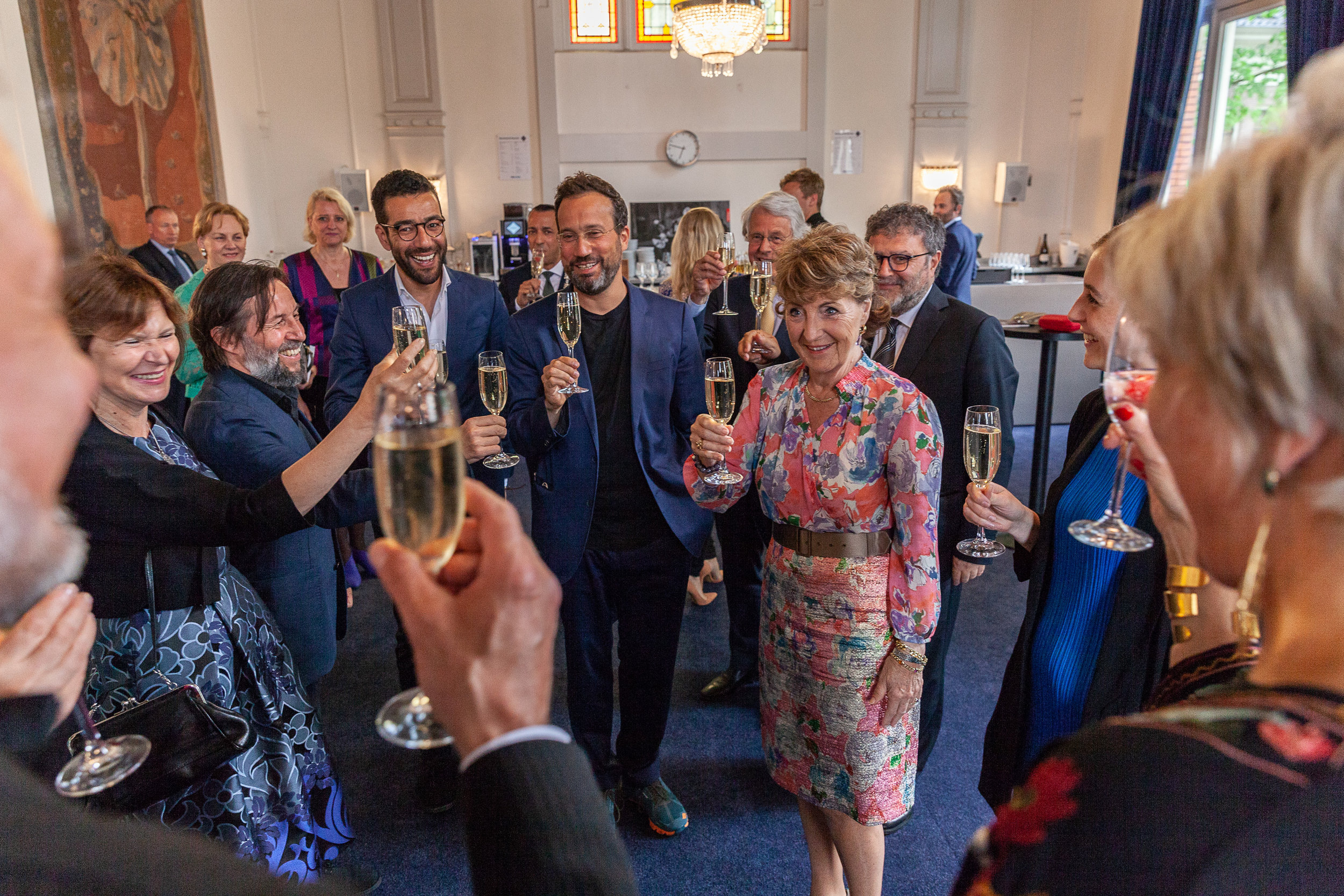
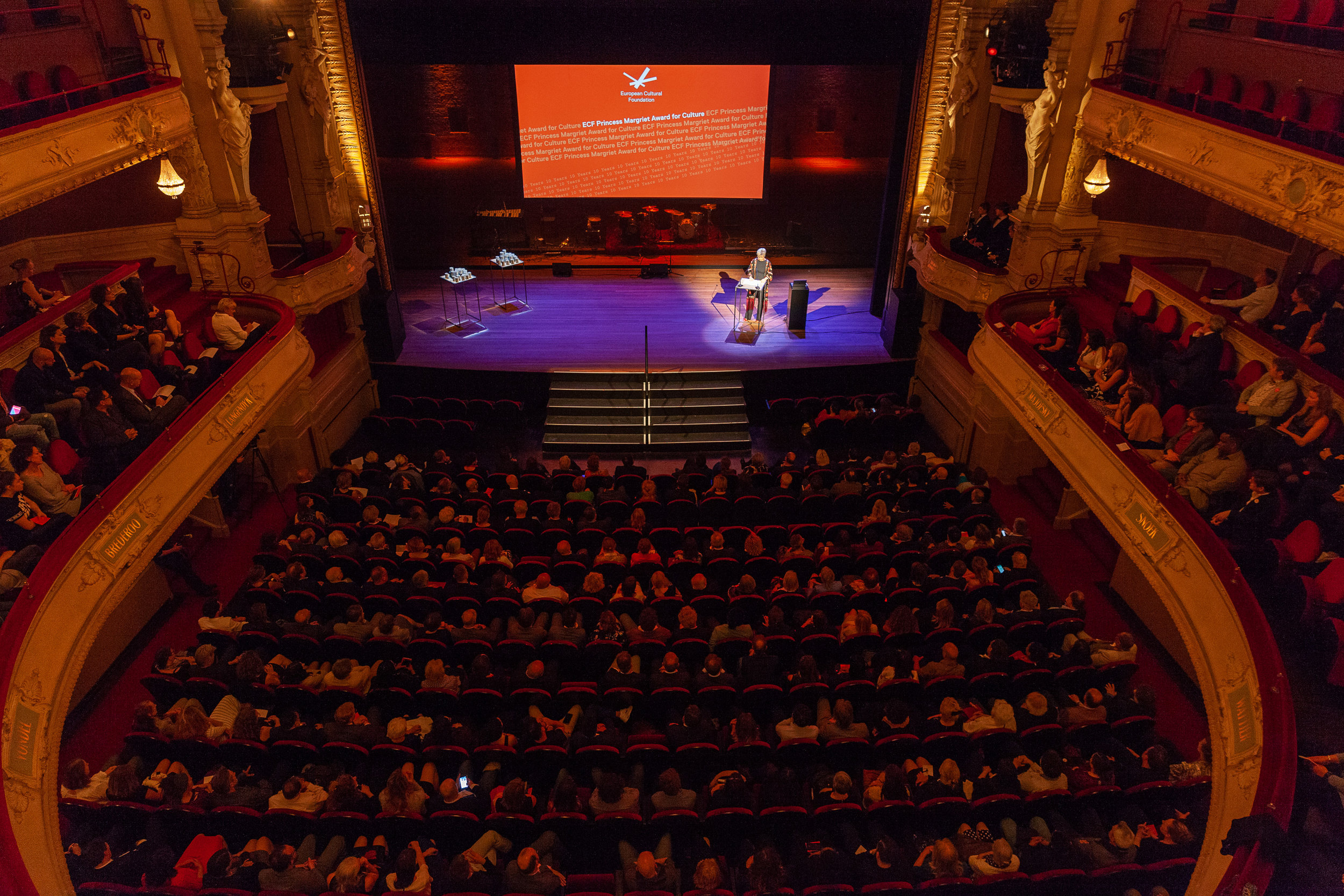
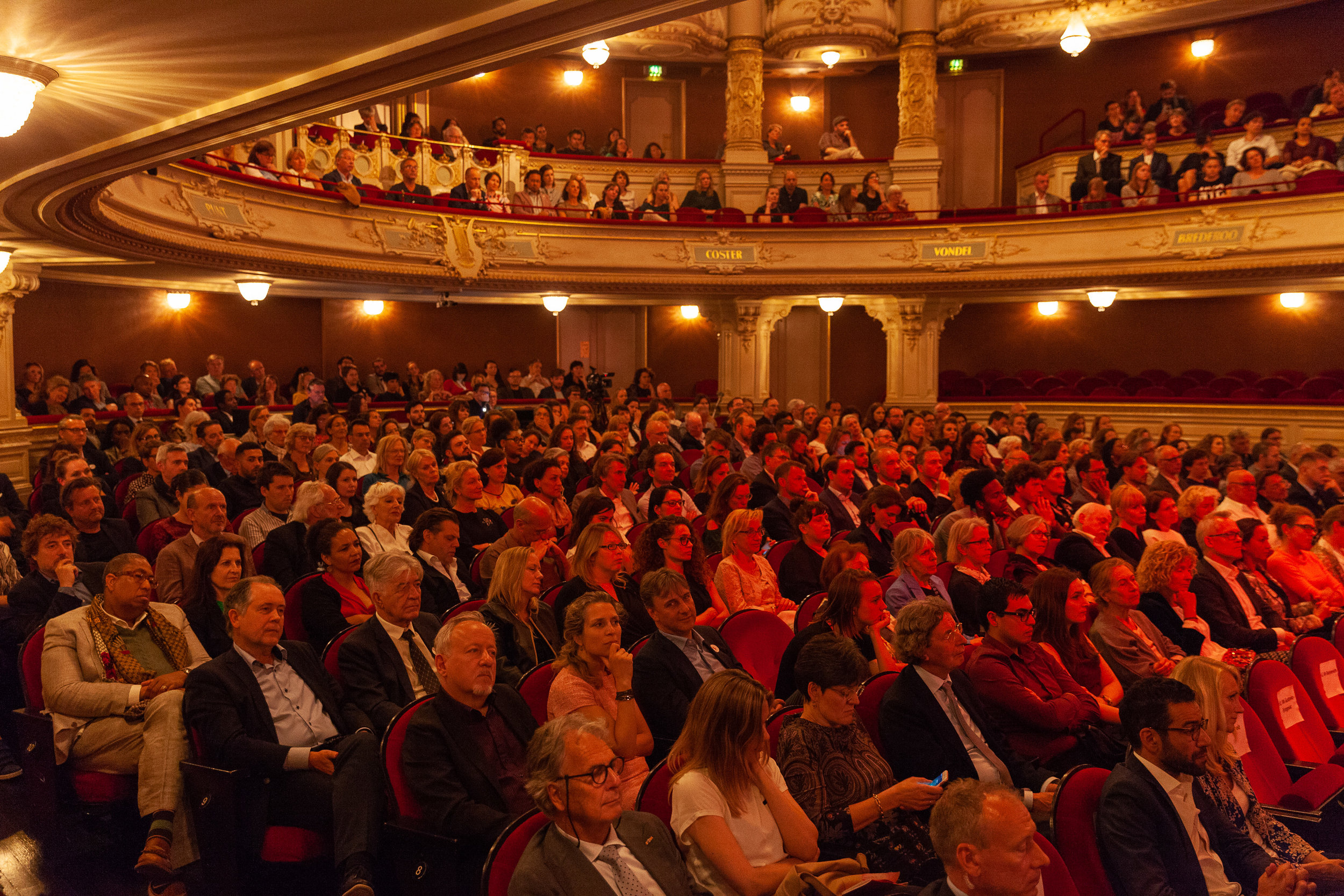
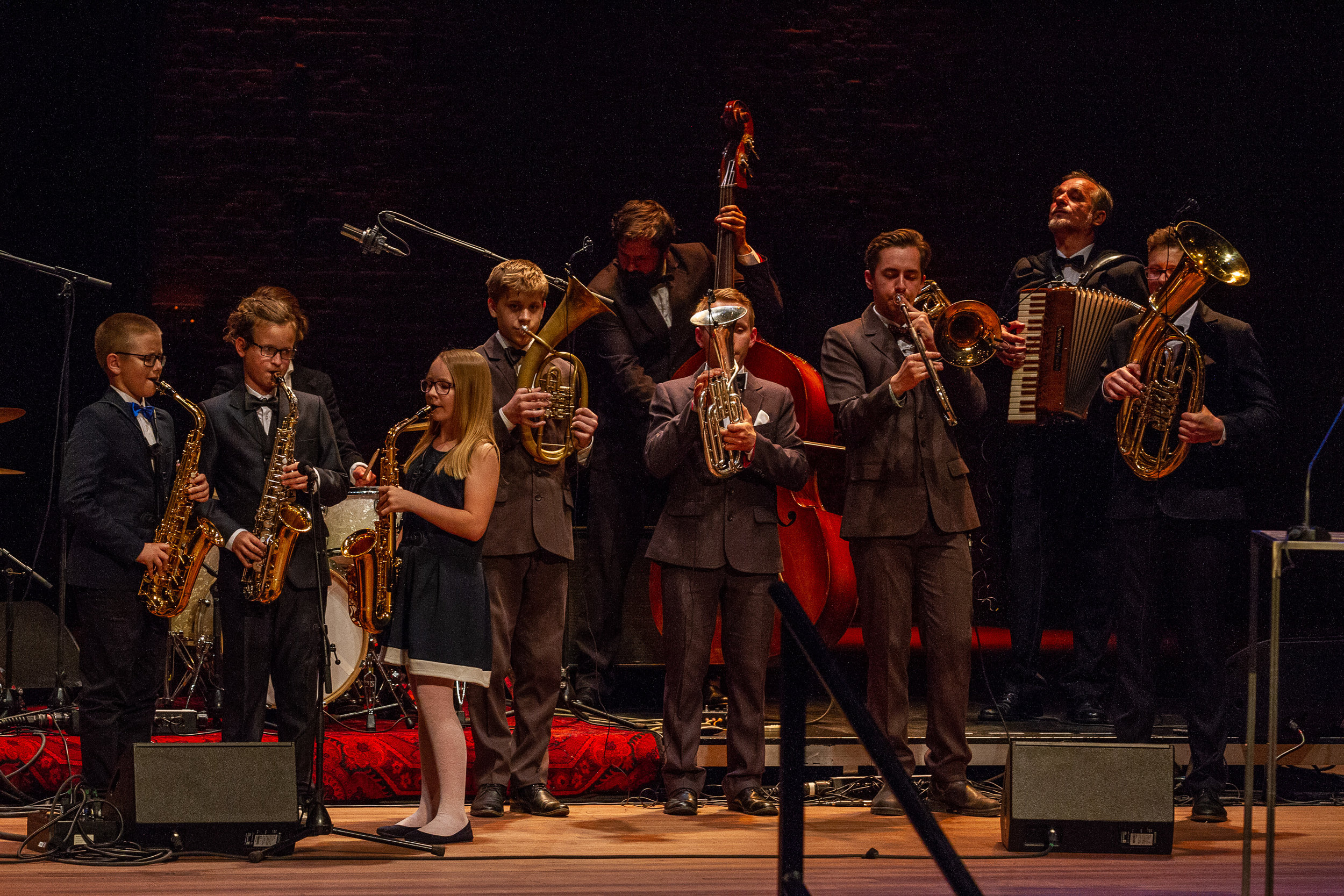

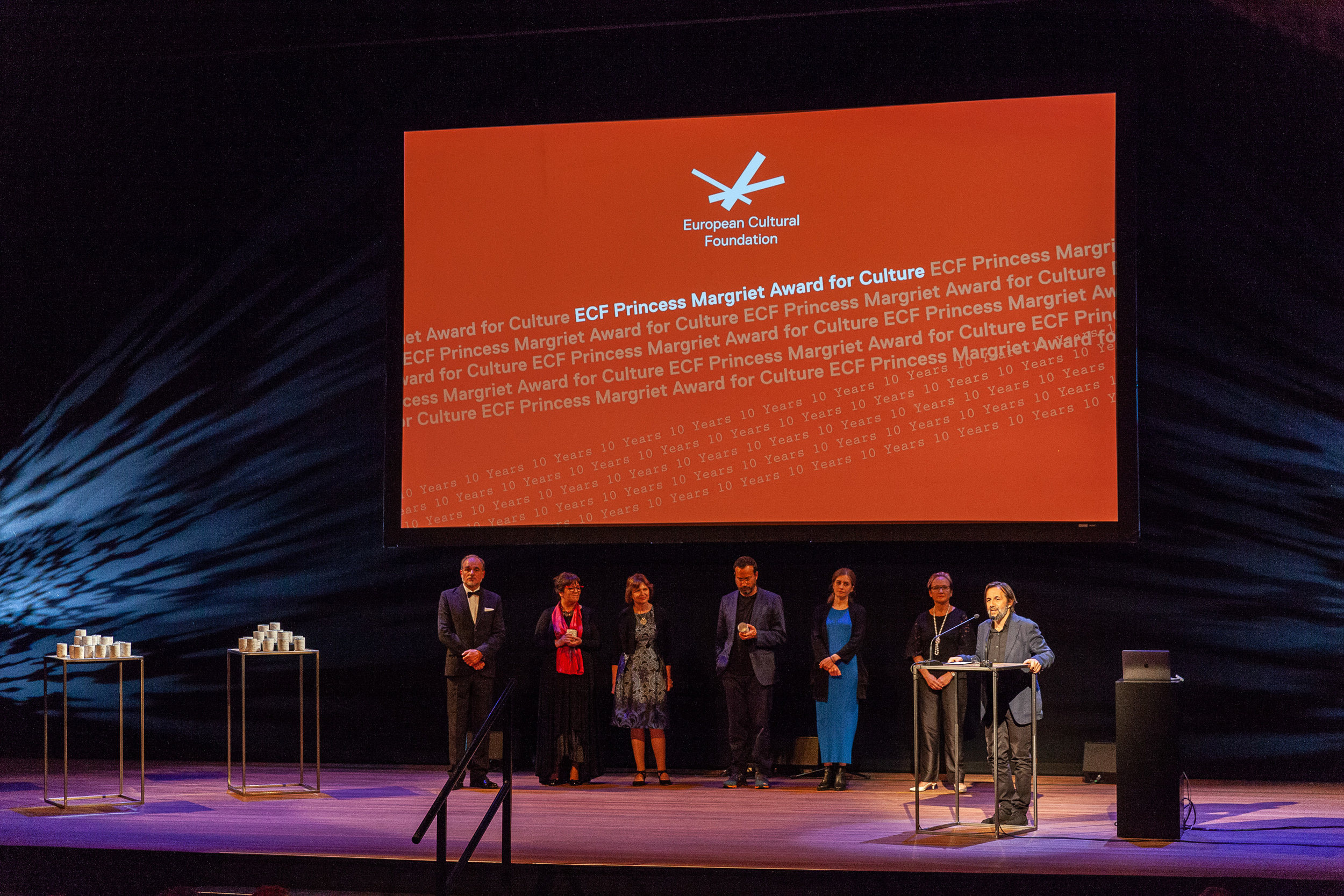

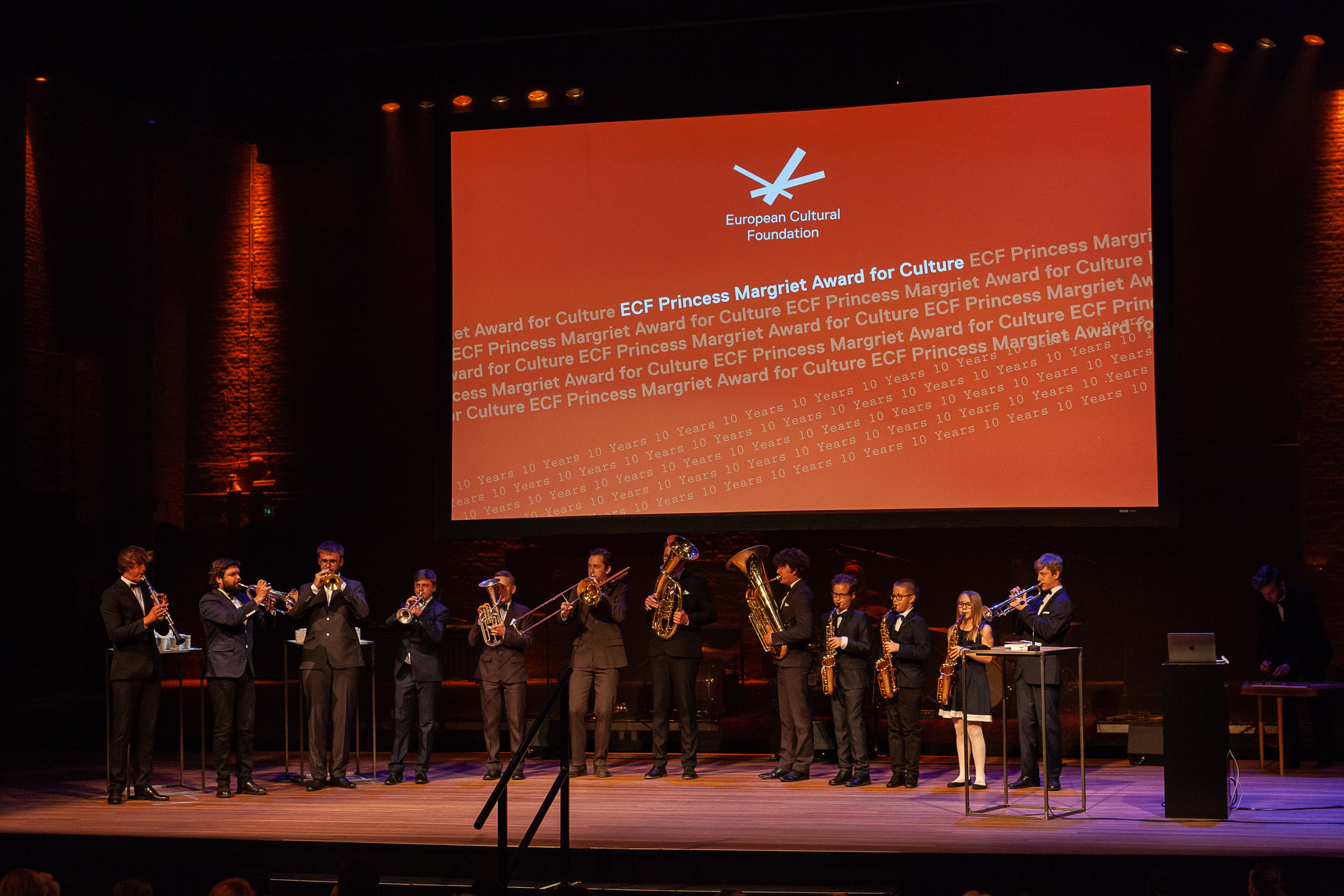
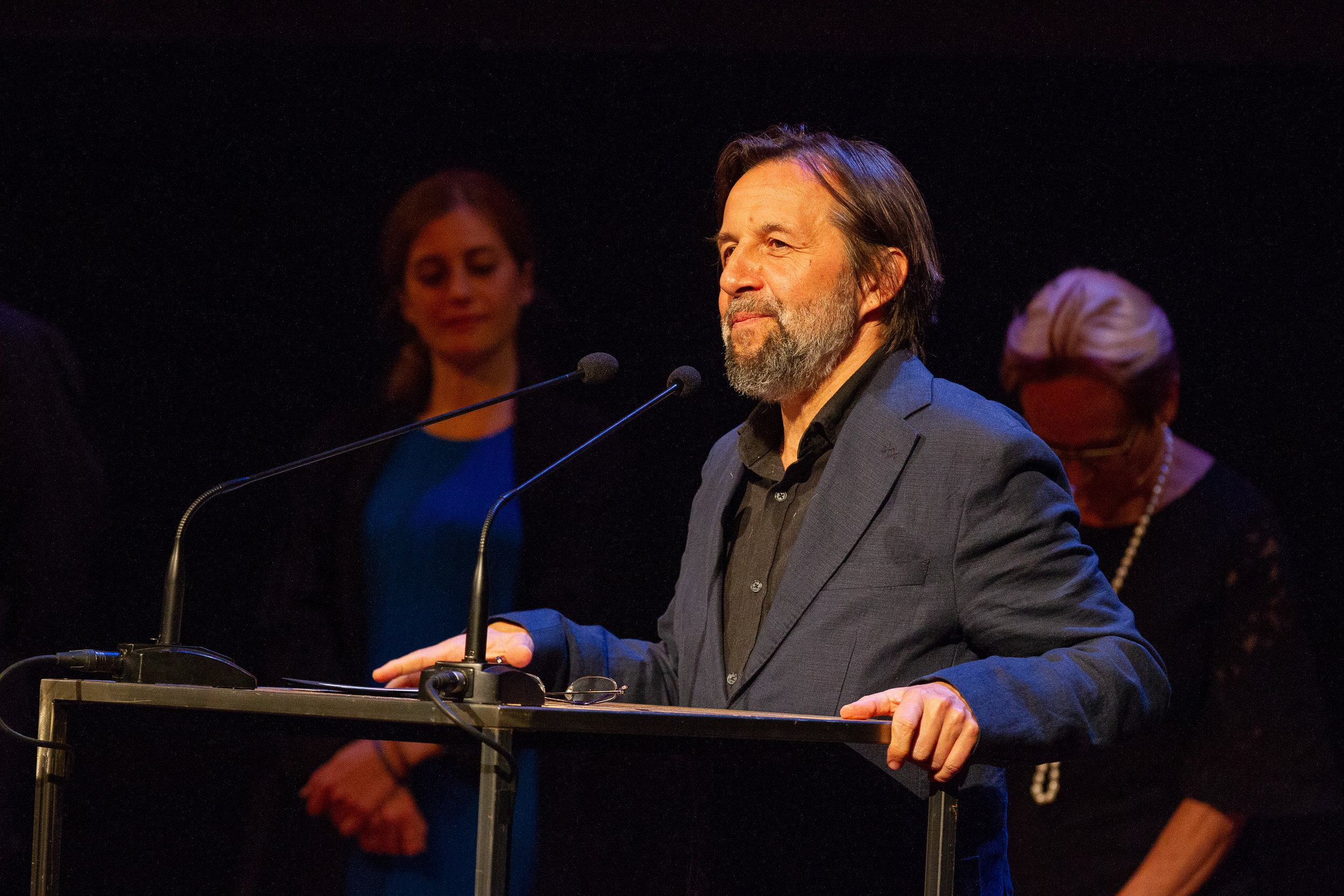
Read in-depth articles in the international press:
Europese Culturele Prijsbekers (ontwerp door Jan Rothuizen), 05/06/2018, Kunstenaar.nl, The Netherlands
Het Bureau Forensic Architecture gebruikt bouwwerken om misdaden op te helderen, 24/05/2018, Volkskrant, The Netherlands
Laurentien vol lof over werk Prinses Margriet, 17/05/2018, Blauw Bloed, the Netherlands.
Koen Van Synghel bespreekt het werk van Forensic Architecture, dat in Amsterdam de Europese cultuurprijs Princess Margriet Award krijgt, 17/05/2018, Podcast Klara.be, Belgium.
Margriet reikt ECF Awards uit, 17/05/2018, De Telegraaf, The Netherlands. (Print version includes a 3/4 page report, online version is an abbreviated piece).
Forensic Architecture and Borderland win European Cultural Foundation prize, 17/05/2018, Apollo Magazine, United Kingdom.
Margriet reikt ECF Awards uit, 16/05/2018, Vorsten, The Netherlands.
Margriet reikt culturele prijzen uit, 16/05/2018, RoyalBlog.nl, The Netherlands.
Koningspaar naar Middelburg en Amsterdam, 16/05/2018, Vorsten, The Netherlands.
Promuovere il cambiamento sociale attraverso la cultura, 15/05/2018, Il Giornale delle Fondazioni, Italy.
Tenth ECF Princess Margriet Award for Culture, 12/05/2018, EFlux, USA.
Prinses Laurentien heeft over het belang van de Prinses Margriet Award in NPO1: Tijd voor Max, 10/05/2018, Interessantoptv.nl, The Netherlands.
TV interview on NPO 1 ‘Tijd vor Max’ with HRH Princess Laurentien (starting at 16:00 minutes into the show), 10/05/2018, The Netherlands.
#Holandia: Orkiestra Klezmerska Teatru Sejneńskiego zaprasza do Amsterdamu na jedyny koncert, 10/05/2018, Polonia.nl, Poland.
Independent research agency Forensic Architecture win another award, 30/04/2018, Itsnicethat.com United Kingdom.
Forensic Architecture has "mixed feelings"about Turner Prize nomination in week of setbacks, 27/04/2018, DeZeen.com, United Kingdom, 3 Novices Europe, and Indigo Interiors Blog, all United Kingdom.
ECF Princess Margriet Award for Culture 2018, 19/04/2018, LirinArt, the Netherlands.
Margriet en Laurentien weer samen op pad, 12/04/2018, MSN News, The Netherlands.
International Award for Polish Cultural Centre, 10/03/2018, Radio Poland, Poland.
ECF reikt tiende Princess Margriet Awards for Culture uit, 08/03/2018, De Dikke Blauwe, The Netherlands.
Forensic Architecture and Borderland to be honoured with top European nod, The Daily Brit, United Kingdom.
Forensic Architecture and Borderland to be honoured with European Cultural Foundation's Award for Culture, Architect’s Datafile UK, and Net Mag Media, United Kingdom.
Jury Report - 2018 ECF Princess Margriet Award for Culture
Their Royal Highnesses and the 2018 laureates. Photo by Xander Remkes.
"On 7 and 8 January 2018 we chose two outstanding laureates. They come from very different parts of Europe and are informed by differing cultural approaches, yet in their work—in addition to their individual excellence—we recognise a shared desire to address the complexity of the past in order to uncover the contours of a more democratic future.
Though vastly different in their methodologies—one uses architectural, aesthetic and scientific technologies to probe crime sites, while the other draws upon the realms of theatre, literature, poetry and music to create spaces of exchange and togetherness—both help redefine the ways that we jointly see, understand and relate to the interconnected world in which we live.
Their art revolves around making sense of the social, political and cultural realities that frame our lives. Yet rather than taking this interconnectedness as a given, they furnish a broader conception of what it means, culturally and politically, to reconfigure the very possibility of a public sphere. Both laureates courageously equip citizens and communities with the power to act and speak together against forgetfulness, the power to reclaim the way in which very local, personal stories—always entangled within the cartography of our global condition—are told.
Forensic Architecture is a research agency based at Goldsmiths, at the University of London, and consisting of an international team of architects, artists, filmmakers, scientists, political theorists and ordinary citizens. Their multidisciplinary practice is unprecedented. They draw on architectural knowledge, but they do not build buildings. Instead, they use advanced imaging techniques to painstakingly rebuild sites where abuses of power have occured: sites of trauma, oppression and injustice. They do this by analysing and recombining an extensive matrix of media and memories. Like archaeologists, they excavate and assemble data that bear witness to the ways in which conflict transforms social, urban, and natural environments.
Thanks to their meticulous investigations, a coherent story emerges from a ceaseless current of media and virtual representations: all facts and facets are combined to create a more complete picture. Often gathered at the request of and together with affected communities and with entities from across society, Forensic Architecture’s findings have served as decisive evidence in a number of legal cases in national and international courts, in citizen tribunals and human rights trials, and have prompted military, parliamentary and United Nations inquiries. ‘Forensics’ stems from the Latin forensis: ‘pertaining to the forum’. True to these etymological roots, the group presents its investigations of cases in various judicial, political and legal forums. Forensic Architecture’s work has also appeared in cultural and artistic venues, redefining aesthetic practice as a way of intensifying the possibilities afforded by what is witnessed and who is witnessing. As such, the work courageously undertakes a ‘counter-forensics’ where communities, survivors and a broad base of civil society actors become part of a collective transformation, sparking an incandescent flare of hope in this ‘post-truth’ era, that ethical, narrative, cartographic and cultural expressions of truth—and resistance to its manipulation—are what matters.
Borderland is both an independent organization, founded in 1990, and a local centre for cultural encounters, creation and reflection: the Centre Borderland of Arts, Cultures and Nations, which was established a year later in 1991. Borderland—Pogranicze in Polish—is based in the Sejny- Suwałki border region of northeast Poland, a rural area far from the country’s big-city museums and tourist destinations. It is an area that has been formed by many ‘borderlanders’—people whose lives show traces of intersecting cultural pathways: Lithuanian, Polish, Jewish, Russian Old-believer, Belarusian, and Roma. An area whose heritage is rich in diversity. Yet repeated political efforts to homogenize this diversity—or to destroy it altogether— have only served to draw attention to ethnic divisions. This fabrication of forgetfulness has led to a troubled legacy of deportation, destruction and decay.
For nearly three decades the foundation has researched, revitalized and nutured a model of community-building informed by diverse cultural imaginings and by the art of working critically with memory. Using a wide range of artistic and cultural vocabularies, the foundation involves the entire community in co-creating exhibitions; in writing, translating, publishing and debating literature; in lively hands-on workshops and ongoing theatre and research projects with local young people. The foundation also has an internationally renowned and intergenerational Klezmer orchestra, bringing back to life the musical tradition of Ashkenazi Jews, and it organizes symposiums on cross-cultural dialogue for scholars and cultural practitioners from around the world. Borderland works over a long period of time to build invisible bridges that can span many generations, languages, world views, professions, life experiences and above all, art. These bridges are composed from a more complicated and accurate story, a collective memory, based on recollections of the past, in which there is room for the best and the worst, for atrocities and liberations, for anguish and joy. Connecting these multiple perspectives, between the past and the future, towards a tangible sense of a culture of solidarity for tomorrow. The Jury were moved by the fact that this is a region in north-east Poland that had a tangible heritage that was destroyed by the war and became an intangible heritage. And thanks to the courageous work of Borderland now the intangible once again ahs become tangible.
Across the fluxes of time, Borderland is an active model of dialogue in the organic process of personal and community development, a model that makes us acutely aware that the modern borderland is not only a distant geography straddling countries. Instead, it connects what national, social, economic and cultural borders are intended to separate. In cities just as much as in rural towns, the Borderland is the space in which different people live together across differences yet in proximity to each other. So rather than allowing borders to continue to divide communities, Borderland cultivates the imagination we need in order to navigate complex and changing paths through the borderlands that we all jointly inhabit. "
Sejny Theater Klezmer Orchestra performance
Video of 2018 ECF PMA laureate Borderland’s ‘Sejny Theater Klezmer Orchestra’ performance at the European Cultural Challenge, May 15.
Read MoreHRH Princess Laurentien's Speech - 2018 ECF Princess Margriet Award for Culture
Opening remarks by HRH Princess Laurentien of the Netherlands at the ECF Princess Margriet Award for Culture ceremony in Amsterdam, 16 May 2018
Read More


